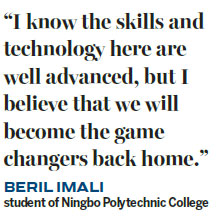Students blazing a trail for Belt and Road future

Young Africans settle into classes at Ningbo Polytechnic College to learn skills that could help improve their countries' prospects
As Ningbo Polytechnic College spearheads the Belt and Road Alliance for Industry and Education Collaboration - officially launched on June 9 - it is already putting its words into practice.
An hour's drive from downtown takes you to Ningbo Economy and Technology Development Zone, near Beilun Seaport, where the college sits on 20 hectares of land. Foreign students have already been integrated into the community to pursue technical courses under the Chinese government scholarship program.
| From left: Lilian Lumayo, Paul Kome, Elizabeth Andia and Beril Imali. The four joined Ningbo Polytechnic College two years ago to pursue technical courses under a scholarship program. Lucie Morangi / China Daily |
There are about 100 students from sub-Saharan Africa studying there. Ningbo college has departments such as Foreign Language, Commerce and Business, Technology and Information. Four young people from Kenya arrived two years ago and have just completed the language competency classes that will ease them into their selected regular programs in September.
As they recall their journey to China, their stories follow a script that could have been written by the same author. After excelling in their final national exams, they were unable to join institutes of higher learning due to prohibitive tuition fees.
All of them, under age 25, turned to the government and applied for funds through the bursary program at the local government's education department. But due to the sheer number of applications, they were only able to get partial funding.
"It still fell short of my target," says 22-year-old Lilian Lumayo, who plans to join an electronic information course at Ningbo.
But the department offered her another option: to consider going to China under a scholarship program. She immediately jumped at the opportunity and submitted her application. After a rigorous selection process, she qualified together with three other students.
Elizabeth Andia, 25, says: "I am fortunate that the program is what I desired to pursue. I have always wanted to be an electro-mechanical engineer and that is what I will embark on starting from September."
Settling down has not been difficult, they say, since the local students and college lecturers have been welcoming. They have had to take Chinese language competency classes to enable them join other students in the regular programs.
But, according to the president of the college, Zhang Huibo, his institution is in the process of building the lecturers' capacity for using English as the language of instruction. Already some programs are taught in English, he says. The college offers more than 30 major programs.

"The success of the BRAIEC hinges on the ease of integrating foreign students into the Chinese higher education system. Therefore, the countries along the 21st Century Maritime Silk Road have to conquer the communication and cultural barriers that still exist."
China has a lot of experience to share with developing countries that are working toward industrialization, he says. And for the Belt and Road Initiative to be successful, together with the "going out" policy that has so far seen Chinese firms venture beyond their borders, technical education has to go global too.
"China also has something to learn from others as it seeks to expand its global reach. We, as a technical institution have to meet this rising demand and thus do things differently. We have just started and I believe there is a lot to learn from the foreign students already in Ningbo," he says.
His words certainly resonate well with 23-year-old Beril Imali, who is taking architectural classes.
"I know the skills and technology here are well advanced but I believe that we will become the game changers back home," she says.
Paul Kome, who will pursue a similar program, says he is already discussing with his graduate friends back home how to establish their own consultancy firm once he graduates.
"We cannot sit on our laurels and expect to secure jobs once we graduate. We will be the catalyst back home," he says determinedly.
They believe that the Belt and Road Initiative has already put Africa on the global map as the next frontier.
"Student exchange will offer us global job opportunities. I think it will also raise the benchmark on the quality of programs offered by colleges back home," says Lumayo.
lucymorangi@chinadaily.com.cn
(China Daily Africa Weekly 06/16/2017 page16)
Today's Top News
- Opening of new gateway can help foster global economic and trade cooperation
- The farmer, the snake and Japan's memory hole
- Crossing a milestone in the journey called Sinology
- China-Russia media forum held in Beijing
- Where mobility will drive China and the West
- HK community strongly supports Lai's conviction































